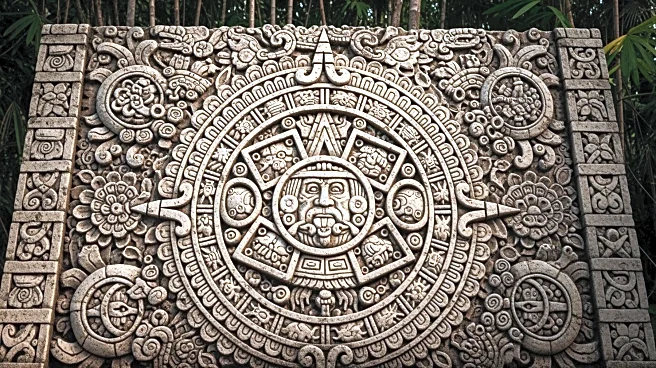What's Happening?
Researchers have deciphered a medieval Maya text that reveals how the civilization predicted solar eclipses with remarkable accuracy. The Dresden Codex, dating back to the 11th or 12th century, is one of the few surviving Maya codices. It contains detailed
astronomical information, including a table for predicting eclipses over 700 years. The study, published in Science Advances, explains how the Maya used advanced mathematical techniques to forecast celestial events, correcting for accumulated errors over time. This discovery sheds light on the sophisticated knowledge of the Maya civilization.
Why It's Important?
Understanding the Maya's eclipse prediction methods highlights the advanced scientific and mathematical capabilities of ancient civilizations. This knowledge contributes to the broader appreciation of indigenous contributions to astronomy and mathematics. The findings challenge Western assumptions about historical scientific knowledge and underscore the importance of preserving and studying ancient texts. The research also provides insights into the cultural significance of celestial events for the Maya, who integrated these predictions into their spiritual and societal practices.
What's Next?
The study opens avenues for further research into Maya astronomy and its applications. Scholars may explore other aspects of the Dresden Codex and similar texts to uncover additional scientific knowledge. The findings could inspire renewed interest in the preservation and analysis of ancient manuscripts, potentially leading to new discoveries about historical civilizations. Additionally, the research may influence contemporary approaches to studying indigenous knowledge systems, promoting interdisciplinary collaboration between historians, archaeologists, and scientists.
Beyond the Headlines
The discovery raises ethical considerations regarding the preservation of indigenous knowledge and the impact of colonization on cultural heritage. The destruction of Maya texts during the Spanish Inquisition highlights the loss of valuable scientific information. This research underscores the importance of respecting and valuing indigenous contributions to global knowledge, advocating for the protection and study of remaining artifacts and texts.


















